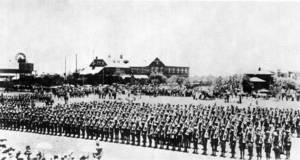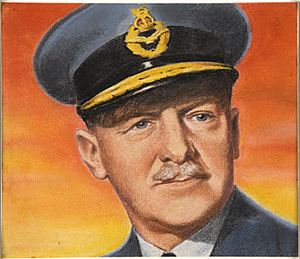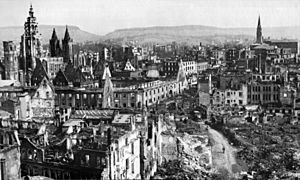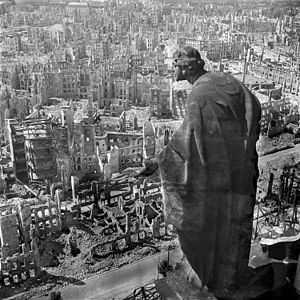Sir Arthur Harris, 1st Baronet facts for kids
Quick facts for kids
Sir Arthur Harris, 1st Baronet
|
|
|---|---|
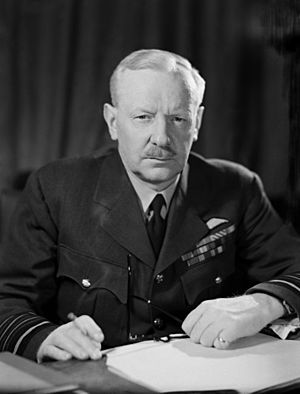
Air Chief Marshal Sir Arthur Travers Harris, 24 April 1944
|
|
| Birth name | Arthur Travers Harris |
| Nickname(s) | Bomber Harris |
| Born | 13 April 1892 Cheltenham, Gloucestershire, England |
| Died | 5 April 1984 (aged 91) Goring-on-Thames, Oxfordshire, England |
| Allegiance | |
| Service/ |
British Army (1914–18) Royal Air Force (1918–46) |
| Years of service | 1914–46 |
| Rank | Marshal of the Royal Air Force |
| Commands held | Bomber Command (1942–45) No. 5 Group (1939–40) RAF Palestine and Transjordan (1938–39) No. 4 Group (1937–38) RAF Pembroke Dock (1933) No. 210 Squadron (1933) No. 58 Squadron (1925–27) No. 45 Squadron (1922–24) No. 31 Squadron (1921–22) No. 50 Squadron (1918–19) No. 44 Squadron (1918) No. 191 Squadron (1918) |
| Battles/wars | First World War Arab revolt in Palestine Second World War |
| Awards | Knight Grand Cross of the Order of the Bath Officer of the Order of the British Empire Air Force Cross Mentioned in Despatches (2) Order of Suvorov, 1st Class (USSR) Distinguished Service Medal (United States) Chief Commander of the Legion of Merit (United States) Grand Cross of the Order of Polonia Restituta (Poland) Grand Cross of the Order of the Southern Cross (Brazil) Grand Officer of the Legion of Honour (France) Croix de guerre (France) |
| Other work | Manager of the South African Marine Corporation |
Marshal of the Royal Air Force Sir Arthur Travers Harris, 1st Baronet, often called "Bomber" Harris, was a very important leader in the Royal Air Force (RAF) during the Second World War. He was in charge of RAF Bomber Command, which was responsible for bombing German cities.
Born in Gloucestershire, England, Harris moved to Rhodesia (now Zimbabwe) when he was 17. He joined the army there when the First World War started. Later, he joined the Royal Flying Corps, which became the Royal Air Force in 1918. He stayed in the RAF for many years, serving in different parts of the world like India and Palestine.
When the Second World War began in 1939, Harris became the head of Bomber Command in 1942. He led the British bombing campaign against Germany. This included "area bombing" German cities, which caused a lot of damage and civilian casualties. After the war, he moved to South Africa. He was made a baronet in 1953, which is a special title.
Harris's choice to use "area bombing" (hitting large areas) instead of "precision bombing" (hitting specific targets) is still debated today. This is partly because it caused many civilian deaths and destruction in Europe.
Contents
Arthur Harris: Early Life and Adventures
Arthur Travers Harris was born on April 13, 1892, in Cheltenham, Gloucestershire. His father worked in India, so Arthur didn't have a strong sense of home growing up. He spent much of his childhood with a kind family in Kent. He went to Allhallows School in Devon. His older brothers went to more famous schools, but there wasn't enough money for Arthur to go to those.
Life in Rhodesia
In 1909, Arthur saw a play about a farmer in Rhodesia. This story inspired him because it showed a place where people were judged by their skills, not their social class. At 17, he told his father he wanted to move to Southern Rhodesia instead of going back to school. His father was a bit disappointed but agreed.
In 1910, Harris sailed to Beira and then traveled by train to Umtali in Rhodesia. For a few years, he worked in mining, driving coaches, and farming. By 1913, he got a steady job at Lowdale Farm near Mazoe. He quickly earned his employer's trust and became the farm manager when the owner went to England. Harris learned a lot about ranching and planned to start his own farm. He felt like a "Rhodesian" and kept that feeling for the rest of his life.
Military Career: From Bugler to Air Marshal
First World War Experience
When the First World War started in August 1914, Harris was in the bush and didn't hear about it for almost a month. Even though he hadn't planned a military career, he felt he should help. He tried to join the 1st Rhodesia Regiment. Only two spots were open: machine-gunner or bugler. Since he knew how to play the bugle from school, he joined as a bugler on October 20, 1914.
The 1st Rhodesia Regiment fought in South-West Africa in 1915. Harris remembered the long desert marches. This was also his first time seeing aerial bombing, though the German plane didn't cause any damage.
After the campaign, Harris returned to Rhodesia. But when it became clear the war in Europe would last longer, he decided to join the "real war." In August, he sailed to England and arrived in October 1915. After trying to join the cavalry and artillery, he joined the Royal Flying Corps as a second lieutenant on November 6, 1915.
Harris learned to fly in late 1915. He served bravely in France in 1917, flying planes like the Sopwith Camel. He shot down five enemy aircraft and received the Air Force Cross. He ended the war as a major.
Between the World Wars
After the First World War, Harris stayed in the new Royal Air Force (RAF). He chose this path because he had a child with his first wife, Barbara, and didn't think she'd like being a farmer's wife in Rhodesia. He served in places like India, Mesopotamia, and Persia. He started using bombing techniques against local tribes in India. In Mesopotamia, he improved his squadron's bombers by adding bomb racks.
Harris also helped develop the use of delay-action bombs, which exploded after a short time. These were used to control revolts in the Middle East. He once said that "the only thing the Arab understands is the heavy hand."
In the 1920s, Harris sometimes thought about leaving the RAF and going back to Rhodesia. He even resigned once but was convinced to stay. He helped create the idea of "area bombing" in Iraq in 1923. He was promoted to wing commander in 1927.
From 1927 to 1929, Harris attended the Army Staff College. He was surprised that the Army kept 200 horses for officers' fox hunting, especially when equipment was scarce. He joked that army leaders would only like a tank if it "ate hay and thereafter made noises like a horse." He also didn't think much of the Navy.
He continued to improve night flying techniques. He was promoted to group captain in 1933. From 1934 to 1937, he worked in the Air Ministry. In 1936, he suggested that "one 250 lb. or 500 lb. bomb in each village that speaks out of turn" would solve problems during the Palestinian Arab revolt. He also helped Southern Rhodesia set up its own air force.
Harris pushed for large strategic bombers that could bomb German targets from England. This led to the development of famous planes like the Handley Page Halifax and the Avro Lancaster.
Leading Bomber Command in World War II
In September 1939, Harris returned to Britain. In February 1942, he was put in charge of RAF Bomber Command. He was promoted to Knight Commander of the Order of the Bath in June 1942.
In 1942, the British government decided to start "area bombing" German cities. Harris was given the job of carrying out this plan. He worked to improve the tactics and technology for bombing. He helped lead devastating attacks against Germany, including the Bombing of Dresden.
Harris believed that bombing alone could make Germany surrender. He often told his superiors the war would be over soon because of the bombing. However, Winston Churchill wasn't always happy with the area bombing strategy. Publicly, the government said Bomber Command was only hitting military targets, and civilian deaths were accidental.
Many other Allied air commanders thought area bombing wasn't as effective. In November 1943, Bomber Command started the Battle of Berlin. Harris wanted to repeat the success of the Battle of Hamburg, but Berlin was much harder. The city was better prepared, and no huge firestorms started. German air defenses were also very strong, and many British bombers were lost.
Harris was promoted to air marshal in January 1944. Southern Rhodesia wanted him to be their Governor, but Churchill and Harris felt he couldn't leave the war at such a critical time.
Before the D-Day invasion in 1944, Harris was told to bomb French railway networks. He didn't like this, as he thought it took away from bombing German industry. After D-Day, Harris continued to focus on area bombing. He believed it was the best way to destroy Germany's ability to fight.
Harris was awarded the American Legion of Merit in January 1945. One of the most debated raids was the bombing of Dresden on February 13, 1945. This caused a deadly firestorm and killed many civilians. Estimates suggest around 25,000 people died. Other raids, like on Pforzheim, also caused many civilian deaths late in the war.
The bombing campaign reached its peak in March 1945. The last major strategic raid was on an oil refinery in Tønsberg, Norway, in April.
After the War and Legacy
After the war, Harris received several awards, including the Polish Order of Polonia Restituta and the American Distinguished Service Medal. He was promoted to Marshal of the Royal Air Force in 1946.
Some in the British government were concerned about the destruction caused by area bombing. Harris retired in September 1946. He wrote a book called Bomber Offensive, where he defended the bombing campaign. He said that the attack on Dresden was considered a military necessity by important people.
Bomber Command crews did not receive a special campaign medal. In protest, Harris refused a peerage (a title like a lord) in 1946. He was the only commander-in-chief not to become a peer.
Harris still hoped to return to Rhodesia as governor, but it didn't work out. In 1948, he moved to South Africa and managed a shipping company called Safmarine.
In 1953, Winston Churchill, who was prime minister again, insisted that Harris accept a baronetcy. Harris then returned to the UK and lived in Goring-on-Thames.
In 1974, Harris appeared in the TV documentary series The World At War, where he talked about his area-bombing strategy.
Family Life
Harris married Barbara Daisy Kyrle Money in August 1916. They had three children: Anthony, Marigold, and Rosemary. Harris divorced Barbara in 1935. He later met Therese ('Jillie') Hearne, who was 20, and they married in 1938. Their daughter, Jacqueline Jill, was born in 1939. Harris loved her very much.
Remembering Arthur Harris
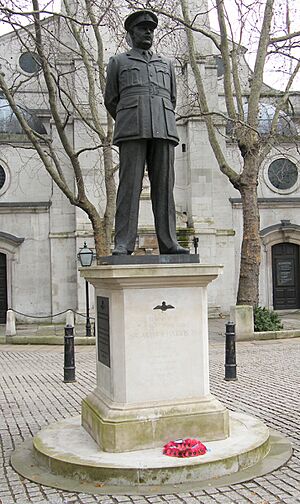
Sir Arthur Harris passed away on April 5, 1984, just before his 92nd birthday. He is buried in Burntwood Cemetery in Goring.
In 1989, a TV drama called Bomber Harris was broadcast, with John Thaw playing him.
In 1992, a statue of Sir Arthur Harris was put up outside the RAF Church of St Clement Danes in London. This caused some protests, especially from people in Germany. Queen Elizabeth The Queen Mother unveiled the statue. An inscription on the statue says: "The Nation owes them all an immense debt." Many former Bomber Command aircrew were there to support him. The statue needed guards for months because protesters often damaged it.
See also
 In Spanish: Arthur Harris para niños
In Spanish: Arthur Harris para niños
 | William M. Jackson |
 | Juan E. Gilbert |
 | Neil deGrasse Tyson |


